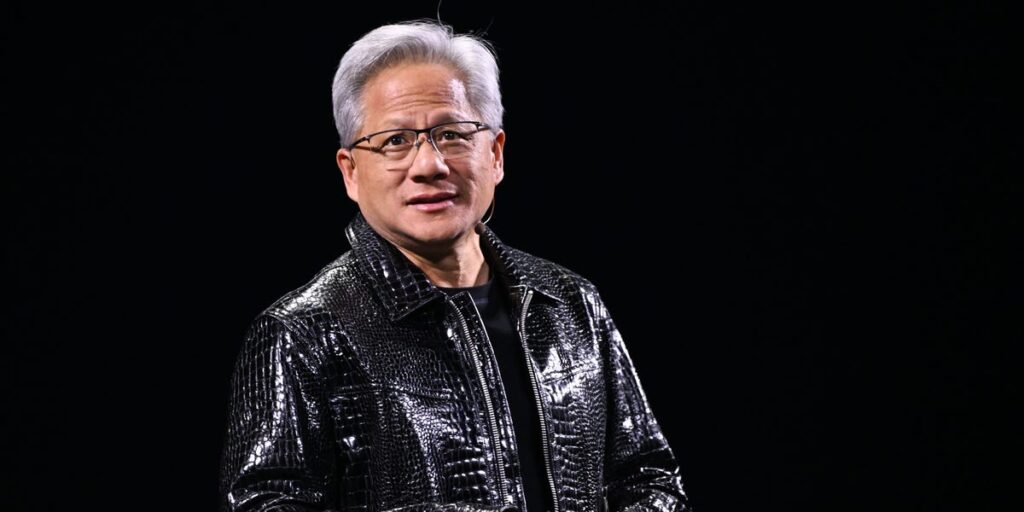The moment Nvidia CEO Jensen Huang had the floor during the company’s first-quarter earnings call on Wednesday, the executive knew there was one thing on everyone’s mind: China.
The question of the day for Nvidia’s earnings was how big of a hit would the chipmaker take as a result of the Trump administration’s export restrictions on H20 chips.
The short was that it’s big, but not big enough to shake Wall Street’s confidence in Nvidia’s position as an AI juggernaut.
Nvidia reported $44.06 billion in revenue for the quarter despite losing one of its biggest customers in the East, beating Wall Street’s revenue expectation of $43.32 billion. Nvidia’s stock was up nearly 5% after trading hours.
The restrictions still had a sizable impact. Nvidia said the move resulted in a $4.5 billion write-down, and the company anticipates a $8 billion revenue loss for the next quarter.
Huang immediately jumpstarted his remarks on Wednesday with sobering thoughts on the restrictions. The CEO said that the export controls on the H20 chip have essentially cut off one of the few ways the company can compete in the country.
“On export control, China is one of the world’s largest AI markets and a springboard to global success. With half of the world’s AI researchers based there, the platform that wins China is positioned to lead globally,” Huang said. “Today, however, the $50 billion China market is effectively closed to US industry.”
While Huang repeatedly criticized the export controls, the CEO appeared to only have praise for President Donald Trump during the earnings call, and his brief media blitz afterward on CNBC and Bloomberg.
“The president has a plan,” Huang said of Trump. “He has a vision, and I trust him.”
Here are 3 takeaways on Nvidia’s China challenge based on Wednesday’s earnings call:
Nvidia took a hit on China, but business is still booming
Nvidia’s revenue took a hit due to the loss of business in China, but its core segments, including data centers, remained strong, leaving analysts with a bullish outlook for the company.
The company reported $39.1 billion in revenue in its data centers segment for the first quarter, a 73% year-over-year increase.
“Even if they’ve taken a hit from the recent tariffs and their inability ship certain units to China, you could still see their trajectory is going upwards,” Gadjo Sevilla, senior AI analyst for EMARKETER, told Business Insider.
Still, Huang does not like the China restrictions
Huang was upfront about the impacts the export controls will have not just on Nvidia but also the US’s standing in the global AI race.
“Export controls should strengthen US platforms, not drive half of the world’s AI talent to rivals,” Huang said.
During a post-earnings call interview on Bloomberg TV, the CEO was asked how Nvidia managed to make up for the losses of China’s business. Bloomberg’s Ed Ludlow asked if it was partly due to the increasing demand of Nvidia’s Blackwell chip system.
“Yeah, I guess so,” Huang said. “But you know, you just can’t underestimate the importance of the China market. This is the second-largest AI market. This is the home of the world’s largest population of AI researchers. And we want all of the world’s AI researchers and all of the world’s developers to be building on American stacks.”
The CEO said in the interview that, “irrespective of the near-term revenue success,” Nvidia can’t ignore the significance of the Chinese market.
The CEO will still play nice with Trump
Huang was careful to keep his criticisms on the US export controls on China contained to just that — a criticism of the export controls.
Shortly after Huang said that the export restrictions have essentially locked Nvidia out of the Chinese market, the CEO began to praise Trump’s “bold vision to re-shore advanced manufacturing, create jobs, and strengthen national security.”
Huang also celebrated the US’s deal with Saudi Arabia for a $600 billion AI infrastructure project and the Trump administration’s move to remove a Biden-era policy known as the “AI Diffusion Rule” which placed export limits on US chips.
“President Trump wants US tech to lead,” Huang said during the call. “The deals he announced are wins for America, creating jobs, advancing infrastructure, generating tax revenue, and reducing the US trade deficit.”
Beyond China
While Nvidia’s business in China remains in limbo, Huang hinted at his company’s plans to explore other horizons, talking about the importance for nations to build “sovereign AI” and his plans to tour Europe.
“With respect to further announcements, I’m gonna be on the road next week through Europe,” Huang said. “Just about every country needs to build out AI infrastructure.”
The CEO said during an interview with Bloomberg TV that he’ll be meeting with many “heads of states” in the near future.
Sevilla, the senior AI analyst for EMARKETER, told BI that Huang’s move to explore other countries is “smart.”
“That’s diversification,” Sevilla said. “The only thing you need to consider is that that’s going to take time. It’s not going to happen overnight.”



